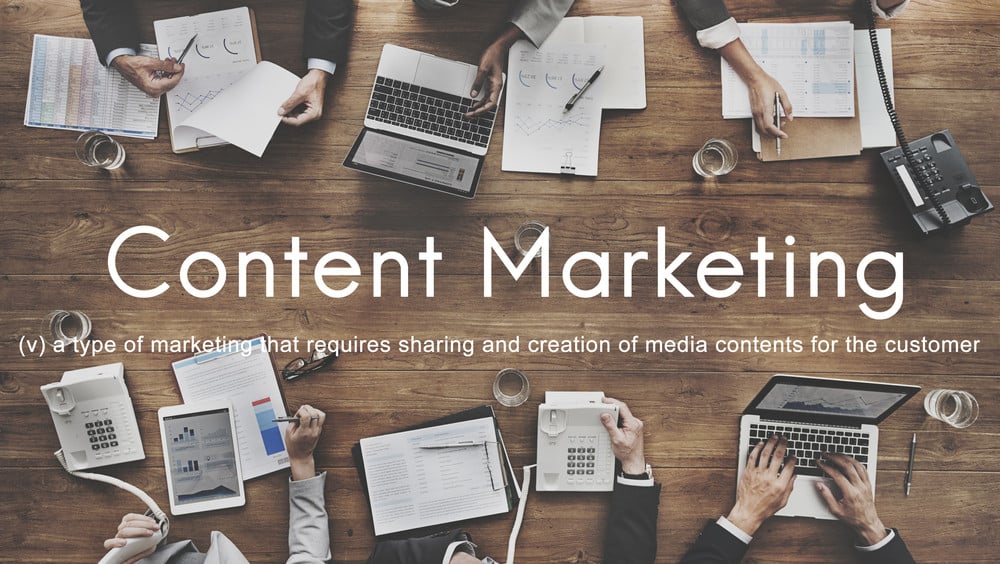
Marketing isn’t what it used to be. In lieu of more unobtrusive, native advertising hooks used today, companies up until the mid-to-late 90’s pitched products to consumers at will. Interruption marketing, as it’s now known as, is an umbrella term for any marketing activity that pushes products/services in front of people who don’t ask (or want) to see them. Was it effective? Yes. Was it annoying? Definitely.
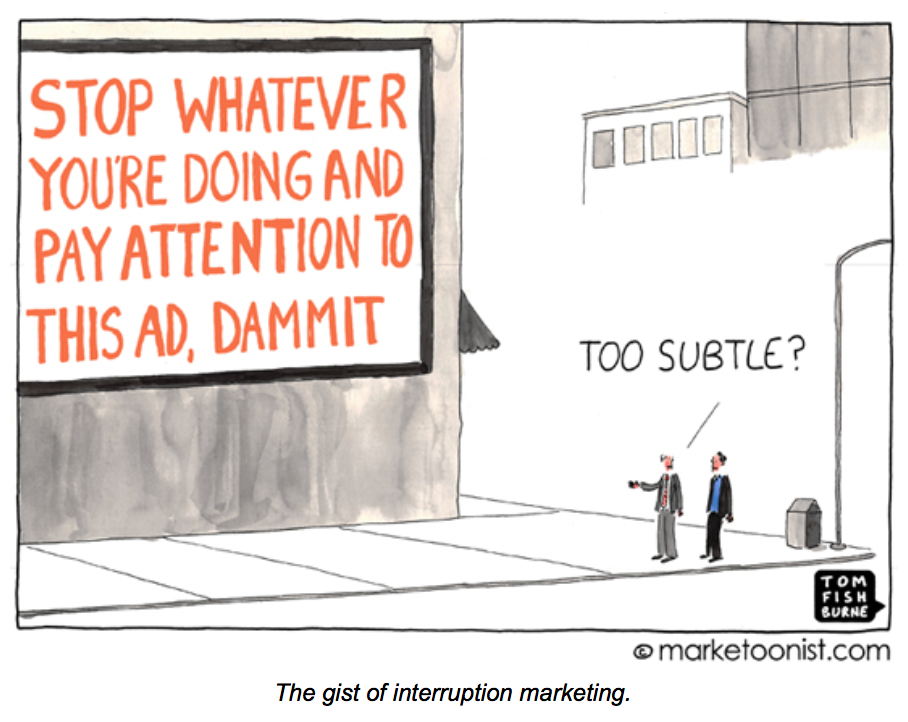
Understanding Content Marketing
It’s a pretty straightforward premise: businesses drive customer action with aggressively advertised products. Some B2C examples today include cold calls, TV commercials, and those loveable YouTube pre-roll ads we all look forward to. But in an increasingly online world, the value proposition of traditional infomercials, radio spots, and print adverts has rusted over time. Millennials today represent nearly a quarter of the total market. They’ve grown up with the noise and they’ve learned how to tune it out. So what’s a genuine, authentic marketer like yourself to do? Simple. You do content marketing.
What exactly is content marketing?
It’s been around for hundreds of years (as seen in this example from 1672) and Google Trends has tracked its meteoric growth since 2007. Joe Pulizzi, founder of the Content Marketing Institute (CMI), defines content marketing as:
“A strategic marketing approach focused on creating and distributing valuable, relevant, and consistent content to attract and retain a clearly defined audience — and, ultimately, to drive profitable customer action.”
“Valuable” and “relevant” are the keywords here. Content marketing educates prospects through useful content. Unlike interruption marketing, it provides information that people actively search for rather than avoid. If there’s one maxim content marketers live by, it’s “show, don’t tell.”
The Great 8: Popular Content Marketing Formats
1. Blogging
It’s what we’re doing right now and it’s central to many businesses’ content marketing strategies. The best blog posts are informative, optimized for search engines, and shareable. They’re also great for driving traffic to company websites and building relationships with readers.
2. Case studies
These persuasive narratives analyze a specific business situation to demonstrate its effect. For content marketers, that usually means describing clients before, during, and after a service has been provided to them. If you’re in sales, for example, you can write a case study explaining how your client was struggling to close more deals, how your product/service helped, and the results you both saw over time.
3. White papers
White papers are in-depth, well-researched reports that present a problem and its solution. Marketers create them to educate readers about a particular issue while promoting their own product or service (a.k.a the solution). In a nutshell, they're advanced problem-solving guides.
4. Ebooks
Unlike blog posts or videos, eBooks are downloadable and feel more like real objects of value to customers. Businesses can write them to showcase their authority on a given subject in greater depth than blogs ever could. They also double as excellent lead generation tools, enabling companies to build reader profiles by gating content behind contact info collection forms.
5. Long-form content
Conventional marketing wisdom has it that people are busy, have the attention spans of a toddler, and can’t be bothered with content that takes longer than 1 minute to read, right? Not quite. Most experts agree that long-form content ranging between 1,200 to 2,000 words is highly beneficial for SEO and lead conversions.
6. Infographics
Infographics combine text, images, and data into an easy-to-read presentation. They’re visually compelling mediums and can communicate complex information in a highly shareable, viral format.
7. Videos
With YouTube as the world’s second largest search engine, it’s no surprise that video is among the most popular and versatile tactics leveraged by content marketers today. Videos are rich blends of sounds, visuals, and motion that drive deeper engagement with brands. They’re ROI machines and will continue to provide more value for boosting engagement in 2018.
8. Slideshows
SlideShare is one of the top 150 most highly-trafficked sites on the Web. The popular slide hosting service receives 60 million visitors and produces 3 billion slide views every month, proving that slideshows are great for drawing attention. For marketers, converting existing content into slides is a great way to double traffic with only half the work.
The Most Effective Content Marketing Collateral: What the Stats Say
Content is king, but not all of it is created equal. And not all types of content are equally effective.
Here’s a comprehensive look at which content marketing formats B2C and B2B marketers frequently use, according to a survey conducted by the CMI and MarketingProfs:
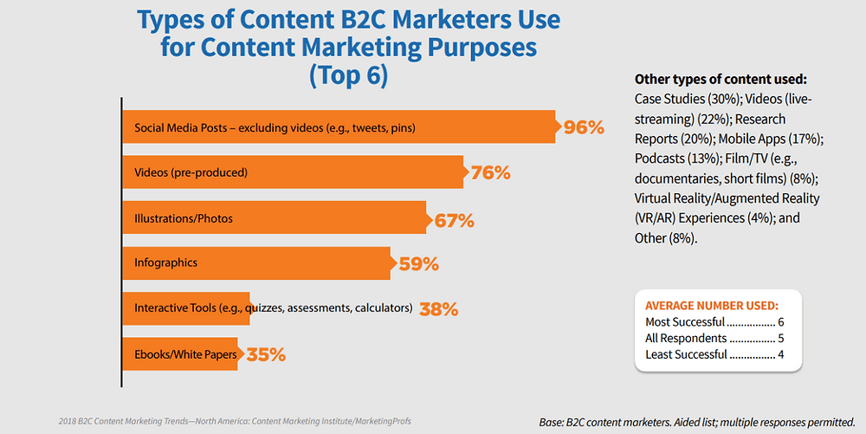
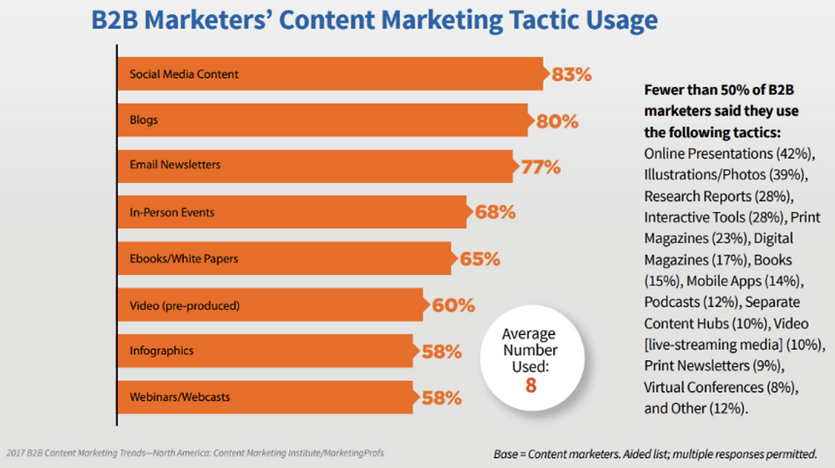
The following infographic is from Social Media Examiner’s Social Media Marketing Industry Report. It depicts the various types of content used by marketers besides social media (which includes blog posts):
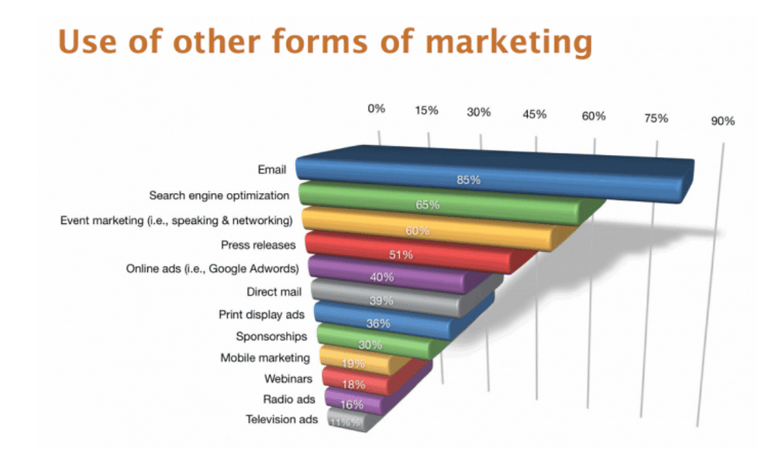
The list below compiles different content marketing tactics and their overall effectiveness, as rated by B2C and B2B marketers in the aforementioned CMI/MarketingProfs survey:
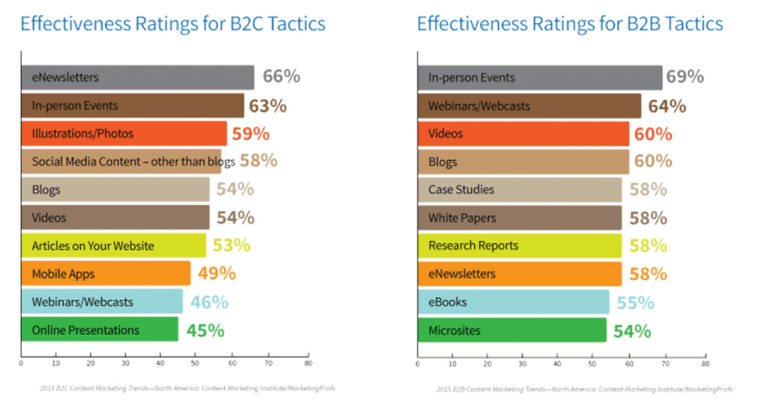
And finally, here are the formats that work best for European content marketers:
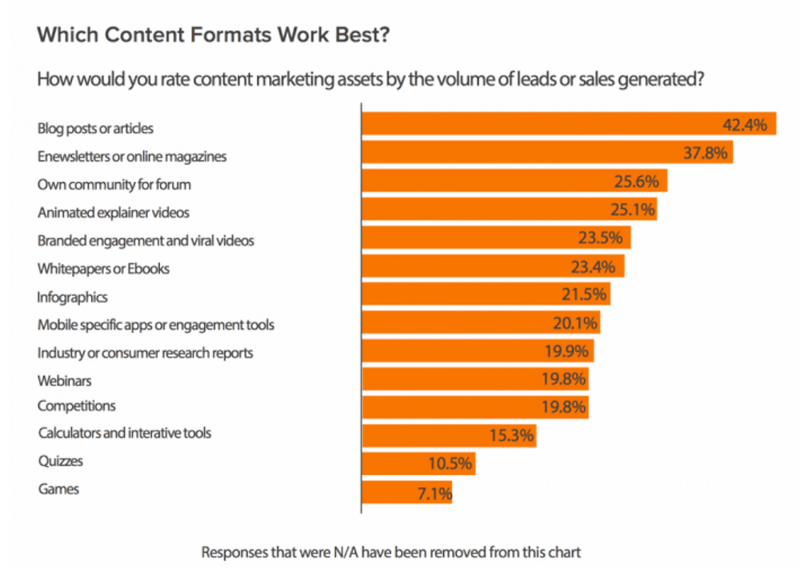
Making Content Marketing Work with Joomag
In a market flooded with information and constant digital distractions, efficiency is every marketer’s best friend. Businesses need a dedicated, holistic solution to coordinate their content marketing strategies with ease.
Enter Joomag-- the all-in-one content marketing platform trusted by 500,000+ businesses worldwide. A one-stop shop for interactive content creation, management, distribution, and marketing, Joomag offers simple yet sophisticated tools to help marketers plan and execute their marketing initiatives.
Engage audiences and achieve higher returns on content investment with cutting-edge software. Create content from scratch, by uploading a PDF file, or by choosing a predesigned template. Then imbue your marketing collateral with rich interactivity and use Joomag’s content distribution network to ensure it doesn’t get lost in the crowd.
Examples of Content Marketing Done Right
We’re big fans of content marketing and spend a lot of time conducting case studies with our customers. Everyone loves a good story, and each case study we’ve written tells a different one about us and, more importantly, our beloved clients. You can find Joomag’s full collection of case studies here, or read the three we’ve linked below for you.



